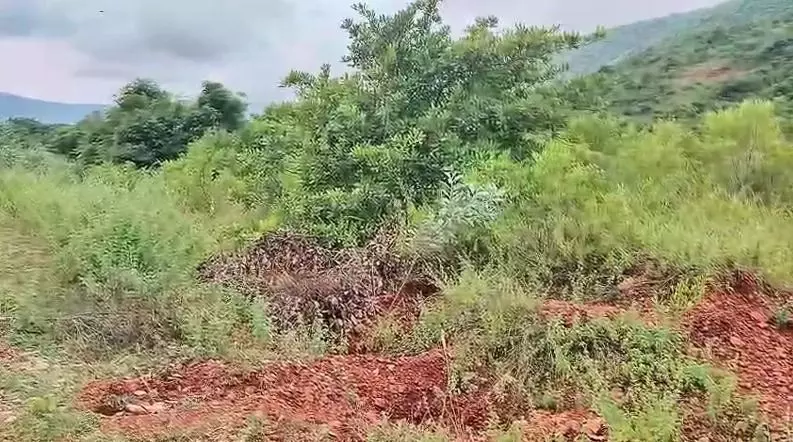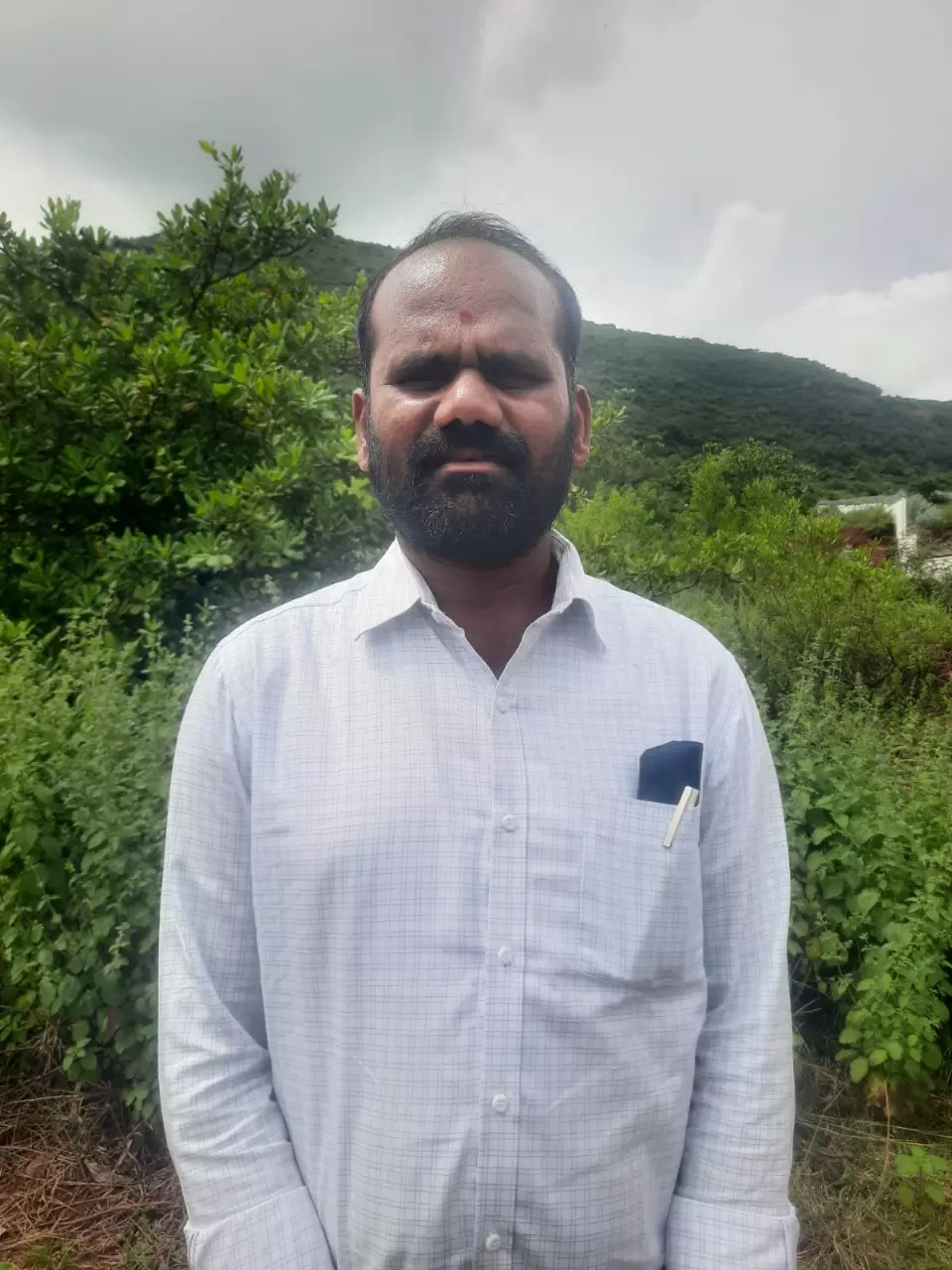
- Home
- India
- World
- Premium
- THE FEDERAL SPECIAL
- Analysis
- States
- Perspective
- Videos
- Sports
- Education
- Entertainment
- Elections
- Features
- Health
- Business
- Series
- In memoriam: Sheikh Mujibur Rahman
- Bishnoi's Men
- NEET TANGLE
- Economy Series
- Earth Day
- Kashmir’s Frozen Turbulence
- India@75
- The legend of Ramjanmabhoomi
- Liberalisation@30
- How to tame a dragon
- Celebrating biodiversity
- Farm Matters
- 50 days of solitude
- Bringing Migrants Home
- Budget 2020
- Jharkhand Votes
- The Federal Investigates
- The Federal Impact
- Vanishing Sand
- Gandhi @ 150
- Andhra Today
- Field report
- Operation Gulmarg
- Pandemic @1 Mn in India
- The Federal Year-End
- The Zero Year
- Science
- Brand studio
- Newsletter
- Elections 2024
- Events
Why a nondescript village in Andhra is pinning its hopes for a better tomorrow on Google
Tarluwada, a village 34 km from Visakhapatnam, has been identified as the site of a proposed data centre for Google's AI hub in Andhra. A village with no college, hospital, ATM centre, cinema theatre, hotel, or petrol pump, residents hope the Google centre will bring jobs for their youth.

It takes a few zoom-ins to locate Tarluwada on the map of India on Google Maps. First, you need to zoom in on the state, Andhra Pradesh. Then keep zooming further on the district of Visakhapatnam till you find the Anandapuram mandal town (an administrative unit similar to taluk consisting 8 to 10 panchayats), and finally, after another zoom in or two, Tarluwada. Interestingly, it is Google,...
It takes a few zoom-ins to locate Tarluwada on the map of India on Google Maps. First, you need to zoom in on the state, Andhra Pradesh. Then keep zooming further on the district of Visakhapatnam till you find the Anandapuram mandal town (an administrative unit similar to taluk consisting 8 to 10 panchayats), and finally, after another zoom in or two, Tarluwada. Interestingly, it is Google, which is now all set to put this nondescript village of approximately 632 households, according to the 2011 Census, on the global tech map.
Earlier this month, Google announced an investment of approximately $15 billion over 2026-2030, to set up the company’s first artificial intelligence (AI) hub in Andhra Pradesh — reportedly, the company’s largest such in the world outside the US. In a blog post on the company’s website dated 14 October, Thomas Kurien, CEO, Google Cloud, wrote, “This AI hub is a multi-faceted investment combining powerful gigawatt scale data center operations, new large-scale energy sources, and an expanded fiber-optic network, and has the potential to accelerate AI-driven transformation across every sector”.
The news was also shared by Sundar Pichai, CEO Google and its parent company Alphabet, on social media platform X. “Great to speak with India PM @narendramodi @OfficialINDIAai to share our plans for the first-ever Google AI hub in Visakhapatnam, a landmark development. This hub combines gigawatt-scale compute capacity, a new international subsea gateway, and large-scale energy infrastructure. Through it we will bring our industry-leading technology to enterprises and users in India, accelerating AI innovation and driving growth across the country,” his post stated.
The outcome was reportedly described as a “landmark moment” for Andhra Pradesh by chief minister Chandrababu Naidu, who was quoted in the media as saying, “Google has come to Visakhapatnam, we are very happy. According to me, we are in an inspiring time”. The state’s IT minister, Nara Lokesh, reportedly described the deal with Google as a result of “a year of intense discussions and relentless effort”.
As part of the proposal, Tarluwada will see the setting up of a Google data centre..
For Tarluwada residents, not all familiar with Google and its unending possibilities, the upcoming data centre symbolises the hope for a better tomorrow. “They say they’ll build a company near our hill. Everyone thinks our lives will get better. If our village transforms, that’ll be good, right?” asked Simhachalam (identified by first name only), a 60-year-old resident, when The Federal visited Tarluwada last week. Appalanaidu (identified by first name only), a 70-year-old resident, echoed him. “They say some big center is coming to our village. It might be for our educated children — we don’t know much beyond that.”
Residents watch wide-eyed as the village is slowly transforming into a hub of activity, with officials making frequent visits; it’s more action than the old timers have seen in their entire lifetime.
A village of mostly farmers and agricultural labourers, Tarluwada had a total population of 2,586 people at the time of the 2011 Census, with a literacy of 46.96 per cent. Located 34 km from Visakhapatnam district headquarters and 4 km from Anandapuram mandal centre, the only road leading from Anandapuram to the village is 15 feet wide. Though just a kilometre from National Highway 16, the approach road is bumpy. The village has a single government high school; the nearest private junior college is located 4 kilometers away, in the village of Vemulavalasa in the same district. Residences are a mix of small huts, as well as two-and three-story houses. Cow sheds and haystacks are common sights. There are no hospitals, ATM centres, cinema theaters, hotels, restaurants or petrol pumps in the village. Also, no industry, but that is set to change with the Google data centre.

The site of the proposed Google data centre. Photo by B Koteswara Rao
According to reports, three locations were shortlisted for the Google AI hub across Visakhapatnam and Anakapalli districts — 308 acres in Tarluwada, 120 acres in Mudasarlova and 160 acres in Rambili mandal. However, the land at Mudasarlova belongs to the Sri Varaha Lakshmi Narasimha Swamy Devastanam or the Simhachalam Devastanam, so the government has to offer it alternate land before work can start, while at Rambilli, the identified site is near the Naval Alternate Operating Base (NAOB), requiring defense clearance, reports claimed. Thus, work is expected to begin at Tarluwada first.
Addressing concerns of a data centre requiring enormous amounts of water and electricity, PS Avadhani, former principal of an engineering college and retired professor of computer science and systems engineering, Andhra University, Visakhapatnam, spoke of the possibility of using alternate sources of electricity, such as solar power, and desalination of available seawater to meet the demands. As for concerns of heat generated by the data centre, Avadhani added, “That’s a choice you have to make. Whether you want industries or not.”
Also read: Why despite progressive image, Kerala continues to struggle with accepting interfaith marriages
Kurien, too, in his blog, had written, “We recognize that growth must be responsible. Google already operates some of the most energy-efficient data centers in the world. As we expand, we will be working with partners to deliver new transmission lines, clean energy generation, and energy storage systems in Andhra Pradesh, expanding the diverse portfolio of clean energy that contributes to India’s electricity grid.”
Of the 308 acres identified for the project, 110.61 acres comprise land assigned for cultivation (D-patta lands), 89 acres are encroached lands, 102 acres are vacant lands and 7 acres are unclaimed land. While initially, local farmers had opposed giving up their assigned lands for the Google project, most — except for a group of Dalit farmers who claimed to have been protesting for the past three months — have accepted the government-offered compensation and ended their protest, clearing the way for the Google project.
“I’ve given 4.08 acres of my D-patta land for the data centre. We were promised ₹50 lakh per acre, 20 cents of land, and one shop in the upcoming complex. We’re happy that Google is coming to our village,” said Bali Venkatrao, a former deputy sarpanch.
Agree Bali Venkatraju, a local farmer, who claimed to have given up 11 acres of land for the project, “Everyone will benefit — even milkmen, tiffin centers, and small shops. Our income will double, our children will get jobs, and our remaining land will gain more value.”
He had a single caveat, “ We just want jobs in the data centre to go first to those from the village,” Venkataraju added.
According to reports, it is estimated that between 2028 and 2032, the project will add ₹10,518 crore annually to Andhra Pradesh’s gross state product and create about 1,88,220 jobs. The state could also see ₹47,720 crore in productivity gains from Google Cloud-based operations over five years.
Also read: How residents of Jawahar Nagar, Hyderabad's garbage dump, are living with health woes
“If the Google data centre comes to Tarluwada, it will greatly help future generations. B.Tech, M.Tech, and degree holders have to travel far for jobs; some struggle owing to unemployment. With Google here, educated locals like me will get job opportunities and a better lifestyle. The youth are very happy,” said Chandrasekhar, a B.Sc. graduate in Chemistry from Tarluwada, who is currently without a job.

Tarluwada sarpanch BRB Naidu. Photo by B Koteshwara Rao
Talking to The Federal, Tarluwada sarpanch BRB Naidu said the entire village was in celebration mode. “We believe this data centre will bring jobs for our youth and help them settle in life. IT companies will also come up in nearby areas. With these developments, employment opportunities will increase for all sections of society. Our village will get an uninterrupted power supply and clean drinking water. We never imagined a company like Google would come to our village,” he said.
According to Sivakumar (identified by a single name only), CEO of a software company and past president of the Andhra Pradesh chapter of the Confederation of Indian Industries (CII), the Google hub has the potential to draw other industries to the area.
Also read: How a group of villagers in Kerala grew a forest to curb riverbank soil erosion
Real estate developers insist that interest in real estate in and around Tarluwada had already seen a spike. “The number of site purchase inquiries has doubled or even tripled compared to earlier. In the past, buyers used to bargain and ask for lower prices on our plots. But now, the situation has completely changed. With the establishment of the Google data centre, the value of farmers’ lands in Tarluwada has increased significantly — even doubled in many cases. We expect high demand for ventures in and around Visakhapatnam,” said Raghubabu Singamaneni, managing director, MR Promoters and Developers, Visakhapatnam.
The site for the data centre has been identified near a hill in the village. With construction work yet to start, the area remains overgrown with weeds and shrubs. The only indication of the upcoming centre is the excitement among the villagers, the conviction that Tarluwada is poised on the brink of change.
